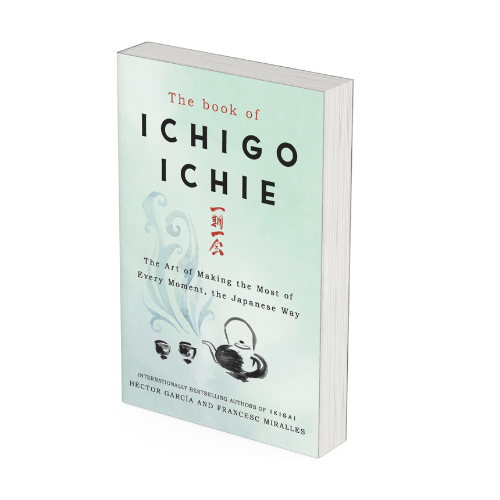The Book of Ichigo Ichie
by Francesc Miralles and Héctor García
The Author
Francesc Miralles is a Spanish author, translator, and musician best known for his writings on happiness, mindfulness, and purpose. Miralles and Héctor García co-authored several works on Japanese wisdom and cultural philosophy, including the well-known Ikigai series.
Miralles draws on considerable studies in Eastern cultures and psychology to combine ancient Japanese practices with contemporary wellness. His writing is accessible and profound, combining practical insights with deep philosophical ideas that have gained him a global readership.
Summary of the Book of Ichigo Ichie
The Book of Ichigo Ichie explains the Japanese notion of “Ichigo Ichie” to Western readers. Ichigo Ichie, which translates as “once in a lifetime” or “this moment exists only now,” is the practice of cherishing each moment and viewing each meeting as a one-of-a-kind and irreplaceable opportunity.
This notion focuses on finding joy and meaning in the current moment while accepting that every experience is transient. The book also provides practical guidance on how to live fully in each moment by cultivating mindfulness, appreciation, and curiosity to create memorable experiences.
The writers draw on Zen and mindfulness ideas to show readers how to uncover wonder in everyday life and make routine moments meaningful. Through simple exercises and philosophical concepts, The Book of Ichigo Ichie encourages us to live consciously, appreciate the people and surroundings around us, and grow our presence.
The book’s narrative combines stories, cultural anecdotes, and activities that promote an attentive approach to daily living. This helps readers internalize the idea of “being in the now” as they pursue joy and fulfillment.
My Thoughts on the Book of Ichigo Ichie
Reading The Book of Ichigo Ichie reminded me to savour life, especially the simple, everyday events that we frequently ignore.
One of the book’s most memorable lessons is that every meeting and experience provides an opportunity to connect deeply—with others and ourselves.
Although it’s easy to get lost in routines, this book encourages us to stop and appreciate the beauty in things we might otherwise reject as banal.
The authors’ advice on practising mindfulness to increase awareness is particularly compatible with therapeutic practice. As a therapist, I encourage my clients to live in the moment and find beauty and joy in their lives.
Moreover, this book endorses this approach and offers unique and culturally rich insights. The emphasis on generating intentional, lasting moments prompted me to consider how we can integrate this technique into therapy and coaching.
For instance, Ichigo Ichie can improve therapy by helping clients reflect on big realisations or find gratitude in minor successes.
What I loved most was that the authors did not romanticise mindfulness as a panacea for all problems. Instead, they highlight the ephemeral character of life, assisting us in accepting that everything, including the most terrible experiences, will pass.
This perspective can be especially empowering for individuals dealing with loss or uncertainty. Furthermore, the warning to enjoy each moment is powerful, as it also demands that we accept the transience of these experiences.
The book’s exercises provide simple yet effective strategies to maintain mindfulness. Creating “small rituals” feels highly relevant to everyday life and offers a practical tool for clients looking to develop healthy habits.
For example, setting a goal each morning or taking a few deep breaths can serve as grounding activities. Over time, these practices can lead to a more centred and calm way of life.
Here are some important lessons I believe clients and coworkers can learn from this book:
- Embrace Impermanence: Recognise that each moment is unique and will never be repeated. This can be especially beneficial for those transitioning, allowing them to let go of past regrets and future fears.
- Practice Mindful Presence: Encourage yourself and others to be fully present. Mindfulness allows us to connect more deeply with ourselves and the people around us.
- Create Small Rituals for Daily Life: Establish small rituals to celebrate the day, such as drinking coffee in the morning, taking a thoughtful walk, or simply appreciating peaceful times. These modest gestures gradually create resilience and delight.
- Find Gratitude in Ordinary Moments: Develop the habit of noticing and appreciating minor, frequently unnoticed details. Whether it’s the colours of the autumn leaves or the warmth of a good discussion, these moments can be incredibly uplifting.
- Convert Encounters into Cherished Experiences: Each interaction should be viewed as a unique opportunity, whether with loved ones or strangers. Making deeper connections in the moment creates long-lasting memories and improves our relationships.
- Reflect Without Judgement: Rather than dwelling on past experiences, engage in gentle introspection to learn and grow. Accept each moment as a learning opportunity.
- Balance Living in the Moment while Setting Goals: Practicing Ichigo Ichie does not imply neglecting our objectives but combining future-orientated thought with appreciating the present journey. This can empower people with self-doubt or fear about the future.
In Summary
The Book of Ichigo Ichie invites you to live fully in the present now, valuing each event as if it will never happen again. Its wisdom inspires us to find joy in our daily lives, making each moment a treasured memory and helping us understand life’s beauty and impermanence.
The Book of Ichigo Ichie
by Francesc Miralles and Héctor García
The Author
Francesc Miralles is a Spanish author, translator, and musician best known for his writings on happiness, mindfulness, and purpose. Miralles and Héctor García co-authored several works on Japanese wisdom and cultural philosophy, including the well-known Ikigai series.
Miralles draws on considerable studies in Eastern cultures and psychology to combine ancient Japanese practices with contemporary wellness. His writing is accessible and profound, combining practical insights with deep philosophical ideas that have gained him a global readership.
Summary of the Book of Ichigo Ichie
The Book of Ichigo Ichie explains the Japanese notion of “Ichigo Ichie” to Western readers. Ichigo Ichie, which translates as “once in a lifetime” or “this moment exists only now,” is the practice of cherishing each moment and viewing each meeting as a one-of-a-kind and irreplaceable opportunity.
This notion focuses on finding joy and meaning in the current moment while accepting that every experience is transient. The book also provides practical guidance on how to live fully in each moment by cultivating mindfulness, appreciation, and curiosity to create memorable experiences.
The writers draw on Zen and mindfulness ideas to show readers how to uncover wonder in everyday life and make routine moments meaningful. Through simple exercises and philosophical concepts, The Book of Ichigo Ichie encourages us to live consciously, appreciate the people and surroundings around us, and grow our presence.
The book’s narrative combines stories, cultural anecdotes, and activities that promote an attentive approach to daily living. This helps readers internalize the idea of “being in the now” as they pursue joy and fulfillment.
My Thoughts on the Book of Ichigo Ichie
Reading The Book of Ichigo Ichie reminded me to savour life, especially the simple, everyday events that we frequently ignore.
One of the book’s most memorable lessons is that every meeting and experience provides an opportunity to connect deeply—with others and ourselves.
Although it’s easy to get lost in routines, this book encourages us to stop and appreciate the beauty in things we might otherwise reject as banal.
The authors’ advice on practising mindfulness to increase awareness is particularly compatible with therapeutic practice. As a therapist, I encourage my clients to live in the moment and find beauty and joy in their lives.
Moreover, this book endorses this approach and offers unique and culturally rich insights. The emphasis on generating intentional, lasting moments prompted me to consider how we can integrate this technique into therapy and coaching.
For instance, Ichigo Ichie can improve therapy by helping clients reflect on big realisations or find gratitude in minor successes.
What I loved most was that the authors did not romanticise mindfulness as a panacea for all problems. Instead, they highlight the ephemeral character of life, assisting us in accepting that everything, including the most terrible experiences, will pass.
This perspective can be especially empowering for individuals dealing with loss or uncertainty. Furthermore, the warning to enjoy each moment is powerful, as it also demands that we accept the transience of these experiences.
The book’s exercises provide simple yet effective strategies to maintain mindfulness. Creating “small rituals” feels highly relevant to everyday life and offers a practical tool for clients looking to develop healthy habits.
For example, setting a goal each morning or taking a few deep breaths can serve as grounding activities. Over time, these practices can lead to a more centred and calm way of life.
Here are some important lessons I believe clients and coworkers can learn from this book:
- Embrace Impermanence: Recognise that each moment is unique and will never be repeated. This can be especially beneficial for those transitioning, allowing them to let go of past regrets and future fears.
- Practice Mindful Presence: Encourage yourself and others to be fully present. Mindfulness allows us to connect more deeply with ourselves and the people around us.
- Create Small Rituals for Daily Life: Establish small rituals to celebrate the day, such as drinking coffee in the morning, taking a thoughtful walk, or simply appreciating peaceful times. These modest gestures gradually create resilience and delight.
- Find Gratitude in Ordinary Moments: Develop the habit of noticing and appreciating minor, frequently unnoticed details. Whether it’s the colours of the autumn leaves or the warmth of a good discussion, these moments can be incredibly uplifting.
- Convert Encounters into Cherished Experiences: Each interaction should be viewed as a unique opportunity, whether with loved ones or strangers. Making deeper connections in the moment creates long-lasting memories and improves our relationships.
- Reflect Without Judgement: Rather than dwelling on past experiences, engage in gentle introspection to learn and grow. Accept each moment as a learning opportunity.
- Balance Living in the Moment while Setting Goals: Practicing Ichigo Ichie does not imply neglecting our objectives but combining future-orientated thought with appreciating the present journey. This can empower people with self-doubt or fear about the future.
In Summary
The Book of Ichigo Ichie invites you to live fully in the present now, valuing each event as if it will never happen again. Its wisdom inspires us to find joy in our daily lives, making each moment a treasured memory and helping us understand life’s beauty and impermanence.
“True healing occurs when I accept the circumstances of my life and forgive myself.”
This quote aligns with Matthew’s emphasis on self-forgiveness and the importance of self-compassion in personal growth and healing.
Recent Thoughts
When Love Turns to Hate: Why Justice Must Stay in the Courtroom and Not Online
admin2025-06-19T14:59:53+02:00June 16th, 2025|Comments Off on When Love Turns to Hate: Why Justice Must Stay in the Courtroom and Not Online
As a therapist working closely with couples and individuals in high-conflict relationships, I have seen the full emotional arc of love, from intimacy
Stress at the Top
admin2025-06-19T15:17:07+02:00May 29th, 2025|Comments Off on Stress at the Top
Why Leadership in Malta is More Isolated Than You Think We often picture business leaders as confident, driven, and in control. They make




